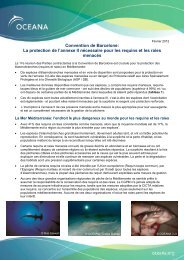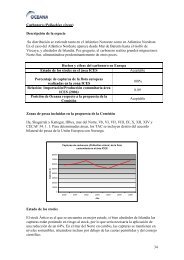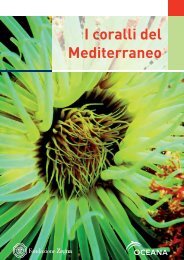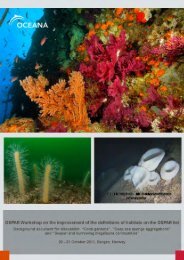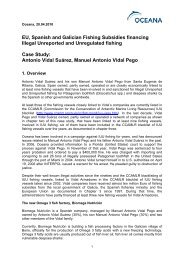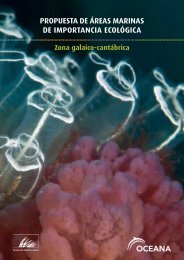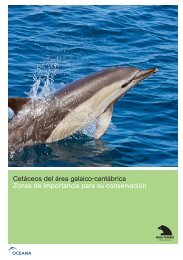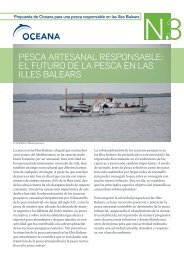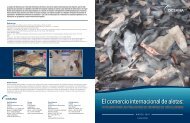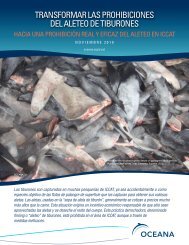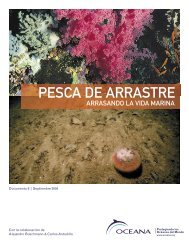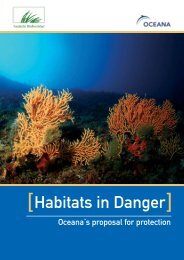Download Oceana Magazine: Winter 2011 PDF
Download Oceana Magazine: Winter 2011 PDF
Download Oceana Magazine: Winter 2011 PDF
You also want an ePaper? Increase the reach of your titles
YUMPU automatically turns print PDFs into web optimized ePapers that Google loves.
<strong>Oceana</strong><br />
A Song For<br />
The oceAnS<br />
Jeff Bridges joined <strong>Oceana</strong> supporters<br />
at the SeaChange Summer Party.<br />
PLUS<br />
Victories for the oceans in<br />
the U.S., Belize, Chile and Europe.<br />
WINTER <strong>2011</strong><br />
oceana.org
<strong>Oceana</strong> campaigns to protect and restore the world’s oceans.<br />
Our team of marine scientists, economists, lawyers and<br />
advocates win specific and concrete policy changes to reduce<br />
pollution and to prevent the irreversible collapse of fish<br />
populations, marine mammals and other sea life. Global in<br />
scope and dedicated to conservation, <strong>Oceana</strong> has campaigners<br />
based in North America, Europe and South and Central<br />
America. More than 400,000 members and e-activists in over 150<br />
countries have already joined <strong>Oceana</strong>. For more information,<br />
please visit www.oceana.org.<br />
BOARD OF DIRECTORS<br />
Dr. Kristian Parker, Chair<br />
James Sandler,<br />
Vice Chair<br />
Simon Sidamon-Eristoff,<br />
Secretary<br />
Valarie Whiting, Treasurer<br />
Keith Addis, President<br />
Herbert M. Bedolfe III<br />
Ted Danson<br />
César Gaviria<br />
María Eugenia Girón<br />
Stephen P. McAllister<br />
Michael Northrop<br />
Daniel Pauly<br />
Susan Rockefeller<br />
Heather Stevens<br />
Sam Waterston<br />
OCEANA<br />
Chief Executive Officer<br />
Andrew Sharpless<br />
Executive Vice President<br />
& General Counsel<br />
James Simon<br />
Senior Vice President,<br />
North American Oceans<br />
& Chief Scientist<br />
Michael Hirshfield, Ph.D.<br />
Vice President,<br />
European Oceans and Seas<br />
Xavier Pastor<br />
Vice President, South American<br />
Oceans & Antarctica<br />
Alex Muñoz<br />
Vice President, Belize<br />
Audrey Matura-Shepherd<br />
Vice President, Strategic<br />
Marketing & Communications<br />
Matthew Littlejohn<br />
Vice President, Global<br />
Development<br />
Bettina Alonso<br />
Director, Pacific<br />
Susan Murray<br />
OCEAN COUNCIL<br />
Susan Rockefeller, Chair<br />
Dr. Andrew Bevacqua<br />
Carolyn Marks Blackwood<br />
Pierce Brosnan<br />
Deborah Buck<br />
Ann Colley<br />
Dan and Beth Cort<br />
Andrew and Sydney Davis<br />
Michael Dershewitz<br />
Barbara Ettinger and Sven Huseby<br />
Christina Falco and Michael Frumkin<br />
Kelsey Grammer<br />
Lea Haratani<br />
Julie Hill<br />
Hardy Jones<br />
J. Stephen and Angela Kilcullen<br />
Larry Kopald<br />
Eve Kornyei<br />
Willa and Ted Lutz<br />
Julie Tauber McMahon<br />
Aaron Peirsol<br />
Nicole Polizois<br />
Linus Roache<br />
Lois Robbins<br />
Anne Alexander Rowley<br />
Ruthie Russ<br />
Mark Ryavec<br />
Starr Scott<br />
Kelly T. Smith<br />
Victoria Stack<br />
Danielle Steakley<br />
Peter Stranger<br />
Susan Trees<br />
Toby Walker, Camper & Nicholsons<br />
Annett Wolf<br />
Nicole Woody<br />
EDITORIAL STAFF<br />
Senior Editor<br />
Suzannah Evans<br />
Online Editor<br />
Emily Fisher<br />
Graphic Design<br />
Heather Ryan<br />
9<br />
January Jones<br />
swims again<br />
with <strong>Oceana</strong> for<br />
a new PSA.<br />
10<br />
One of Chile's marine<br />
biodiversity hotspots<br />
has been saved from a<br />
proposed power plant.<br />
© OCEANA | Tim Calver © OCEANA | Eduardo Sorensen © OCEANA | Cárlos Suarez<br />
WinTer <strong>2011</strong> | conTenTS<br />
12 into the gulf<br />
<strong>Oceana</strong>'s international team headed<br />
to the Gulf of Mexico to study the<br />
marine ecosystem in the wake of<br />
the Deepwater Horizon blowout, the<br />
worst oil disaster in U.S history.<br />
<strong>Oceana</strong> is published by <strong>Oceana</strong> Inc. For questions or comments about<br />
<strong>Oceana</strong>, or to subscribe to <strong>Oceana</strong>, please call <strong>Oceana</strong>’s membership<br />
department at +1.202.833.3900, e-mail membership@oceana.org or<br />
write <strong>Oceana</strong>, Member Services, 1350 Connecticut Ave. NW, 5th Floor,<br />
Washington, D.C. 20036, USA.<br />
<strong>Oceana</strong>’s Privacy Policy Your right to privacy is important to<br />
<strong>Oceana</strong>, and we are committed to maintaining your trust. Personal<br />
information (such as name, address, phone number, e-mail)<br />
includes data that you may have provided to us when making a<br />
donation or taking action as a Wavemaker on behalf of the oceans.<br />
This personal information is stored in a secure location. For our full<br />
privacy policy, please visit <strong>Oceana</strong>.org/privacypolicy.<br />
Please recycle.<br />
Printed with Eco-Ink — low volatility vegetable oil-based<br />
ink on 25% post-consumer recycled, processed chlorine<br />
free paper produced using 100% wind power in a carbon<br />
neutral process.<br />
1 ceo’s note<br />
Andy Sharpless<br />
suggests the<br />
conservation heir to<br />
Teddy Roosevelt.<br />
2 Making Waves<br />
The latest<br />
campaign victories<br />
from <strong>Oceana</strong>'s<br />
international team.<br />
4 news & notes<br />
<strong>Oceana</strong>'s 2010<br />
Ocean Hero Award<br />
winners and more.<br />
12<br />
<strong>Oceana</strong> studies the<br />
Gulf of Mexico after<br />
the worst oil disaster<br />
in U.S. history.<br />
2 SPRING | WINTER 2010 <strong>2011</strong> OCEANA.ORG<br />
| 3<br />
FEATURES<br />
10 Saving Punta de choros<br />
Chileans speak up and help<br />
defeat a coal-fired power plant<br />
near beautiful Punta de Choros.<br />
9 Diving Back in<br />
Actress January Jones reprises<br />
her role as an ocean advocate while<br />
filming with <strong>Oceana</strong> in Belize.<br />
6 Protecting A Pacific gem<br />
The world's fourth largest no-take<br />
marine reserve has been created<br />
in Chile's waters.<br />
on the cover<br />
Jeff Bridges serenaded<br />
the crowd at <strong>Oceana</strong>’s<br />
SeaChange Summer Party.<br />
© OCEANA | Sabrina BonVillain<br />
DEpARTmENTS<br />
5 Q & A<br />
Paul Greenberg<br />
wrote Four Fish<br />
to unite foodies<br />
and fishies.<br />
16 events<br />
<strong>Oceana</strong>'s Geneva board<br />
meeting, the SeaChange<br />
Summer Party, a Buck<br />
dinner and Sam Waterston<br />
at The Explorers Club.<br />
18 Donor Profile<br />
Karen Cahill describes<br />
why ocean conservation<br />
has meaning for her family.<br />
19 chef’s corner<br />
Gaël Orieux introduces<br />
sustainability to his<br />
French customers.<br />
20 Parting Shot<br />
Board member Ted Danson<br />
visits the Arctic for a frigid<br />
foray to the front lines of<br />
climate change.
© Tim Calver<br />
Give Today<br />
<strong>Oceana</strong>’s accomplishments wouldn’t be possible<br />
without the support of its members. You can help<br />
<strong>Oceana</strong> fight to restore our oceans with your<br />
financial contribution.<br />
Call us today at 1.877.7.OCEANA, visit www.oceana.org/give or use the envelope provided in this magazine<br />
to make a donation. Please contact us if you are interested in planned giving that could support <strong>Oceana</strong>’s<br />
work and also provide you with income and potential tax benefits. <strong>Oceana</strong> is a 501(c)(3) organization and<br />
contributions are tax deductible.<br />
Protecting the<br />
World’s Oceans<br />
A Chilean Teddy Roosevelt?<br />
“What we need is a Teddy Roosevelt for<br />
the oceans.” It’s a sentiment I’ve often<br />
heard from blue water colleagues. We<br />
may now have one. He grew up abroad,<br />
took office recently, is a Harvard<br />
graduate and has a name that is hard<br />
for Americans to pronounce. It is not<br />
Barack Obama.<br />
President Teddy Roosevelt, an avid (if<br />
nearsighted) hunter and outdoorsman,<br />
put policy-muscle into the inchoate<br />
yearnings of a young conservation<br />
movement. His leadership created not<br />
just protected places, but defined a<br />
philosophy to sustain nature against<br />
industrial-scale exploitation. His<br />
conservation achievements earned<br />
him a station in the small pantheon of<br />
people who make a fundamental and<br />
permanent contribution to the planet.<br />
But Roosevelt’s conservation agenda<br />
ended at the water’s edge. He left 71<br />
percent of the planet’s surface available<br />
to a successor who might aspire to join<br />
him in the pantheon by becoming a<br />
salt-water conservation hero.<br />
But the “Teddy Roosevelt for the<br />
oceans” title will not be easily won.<br />
During his tenure in the White House,<br />
Roosevelt designated 150 national<br />
forests, five national parks and the first<br />
18 national monuments. Altogether, he<br />
provided federal protection for almost<br />
230 million acres, a land area equivalent<br />
to the east coast from Maine to Florida.<br />
Perhaps no one since has seized<br />
that opportunity because it was just<br />
too intimidating.<br />
From the south comes a candidate<br />
to meet the Roosevelt standard. He<br />
governs a country seemingly designed<br />
by an oceanic obsessive – it is 2,600<br />
miles long and an average of only 110<br />
miles wide. Its Pacific Ocean territory<br />
is more than twice its land area.<br />
Equally important, his country is home<br />
to one of the world’s most productive<br />
fisheries. Its economy is booming. Its<br />
democracy is young.<br />
The place is Chile. The man is President<br />
Sebastián Piñera. And the moment in<br />
the history of this country would seem<br />
very familiar to the young American<br />
president from a century ago.<br />
In four decisions this year, President<br />
Piñera has begun to chart a marine<br />
policy-making course that merits a<br />
comparison with President Roosevelt.<br />
He created the fourth-largest “no<br />
take zone” in the world around Sala<br />
y Gómez Island. He stopped the<br />
construction of a huge power plant<br />
near Punta de Choros that would have<br />
destroyed a marine sanctuary. His<br />
government has established sensible<br />
regulations on the salmon farming<br />
companies whose overcrowded<br />
ocean pens spawned a fish epidemic<br />
of viral anemia. And his economic<br />
minister has, for the first time, cut<br />
the quota for the country’s most<br />
important commercial fishery – jack<br />
mackerel – so that it’s in line with<br />
scientific recommendations.<br />
Although there is much more to be<br />
achieved, this is not a bad start.<br />
I commend President Piñera for his<br />
extraordinary leadership in ocean<br />
conservation. He has taken actions<br />
that will benefit the millions of Chileans<br />
who depend on healthy and abundant<br />
oceans for jobs or food. And we hope<br />
that other presidents – perhaps even<br />
that other Harvard graduate with the<br />
strange name – will be inspired by his<br />
example. It’s time Teddy Roosevelt<br />
had some company up there on the<br />
conservation pantheon.<br />
Thank you, as a supporter of <strong>Oceana</strong>,<br />
for your help while we have campaigned<br />
in Chile for victories that restore<br />
and protect abundant oceans. Our<br />
campaigns – together with our allies –<br />
set the stage for President Piñera. We<br />
could not mount them without your<br />
generous support and continued loyalty.<br />
For the oceans,<br />
Andrew Sharpless<br />
CEO, <strong>Oceana</strong><br />
<strong>Oceana</strong> is grateful for the grants, contributions,<br />
and support it has received from<br />
dozens of foundations and companies and<br />
thousands of individuals. <strong>Oceana</strong> wishes<br />
to thank all of its supporters, especially its<br />
founding funders as well as foundations<br />
and individuals that in 2010 awarded <strong>Oceana</strong><br />
grants totaling at least $500,000: Arcadia<br />
Fund, Gordon and Betty Moore Foundation,<br />
Oak Foundation, The David and Lucile<br />
Packard Foundation, Robertson Foundation,<br />
Rockefeller Brothers Fund, Sandler<br />
Foundation, Zennström Philanthropies, and<br />
Ricardo Cisneros. For more information,<br />
please see <strong>Oceana</strong>’s annual reports at<br />
www.oceana.org/annualreport.<br />
ceo'S noTe<br />
OCEANA.ORG | 1
MAKing WAVeS<br />
2 | WINTER <strong>2011</strong><br />
Illegal driftnets curtailed in the mediterranean Sea<br />
This summer, <strong>Oceana</strong> made great strides<br />
in its campaign to eliminate illegal<br />
driftnets from the Mediterranean Sea.<br />
The nets have been banned by both<br />
the United Nations and the European<br />
Union for years, but many vessels have<br />
continued using them. Thousands of<br />
marine creatures, including whales,<br />
dolphins, sharks and sea turtles are<br />
trapped and killed by this indiscriminate<br />
fishing gear each year.<br />
In June, Italian fishermen from the port<br />
of Bagnara Calabra surrendered their<br />
illegal nets after a nearly year-long<br />
blockade of the port by the Italian Coast<br />
Guard. In August, <strong>Oceana</strong> inspected<br />
ports in southern Italy and Sicily and<br />
confirmed that fewer boats used<br />
the driftnets.<br />
Belize issues a total ban on destructive trawling<br />
Top row: <strong>Oceana</strong> CEO Andy Sharpless,<br />
<strong>Oceana</strong> board chairman Dr. Kristian Parker<br />
and board member Ted Danson, Vice-President<br />
for Belize Audrey Matura-Shepherd and Ovel<br />
Leonardo, Chairman for the Northern Fishermen<br />
Cooperative. Bottom row: <strong>Oceana</strong> board<br />
member César Gaviria, Hon. Rene Montero and<br />
Hon. Manuel Heredia.<br />
In another victory for ocean conservation,<br />
Morocco passed an amendment in<br />
August banning the use, possession,<br />
manufacture or sale of driftnets starting<br />
in <strong>2011</strong>. With 300 vessels using driftnets,<br />
Morocco has been one of the most<br />
notorious users of the wasteful gear<br />
in the Mediterranean.<br />
A month later, Turkey followed suit,<br />
announcing it would stop using the<br />
destructive fishing gear in <strong>2011</strong>. In 2009,<br />
<strong>Oceana</strong> identified at least 30 Turkish<br />
vessels using driftnets in the Aegean and<br />
Mediterranean to target swordfish and<br />
albacore, and there are an estimated 70<br />
to 150 vessels operating in the country.<br />
These three decisions bring <strong>Oceana</strong><br />
closer to the goal of eliminating driftnets<br />
from the Mediterranean by 2013.<br />
In December, the Central American<br />
nation of Belize announced a ban on<br />
all forms of trawling, one of the most<br />
destructive fishing methods in the world.<br />
With the decision, Belize joined just a<br />
few countries in the world which have<br />
completely protected their waters<br />
from bottom trawling.<br />
<strong>Oceana</strong> has now helped protect 1.4<br />
million square miles of the oceans<br />
from trawling in the Atlantic, Pacific<br />
and Arctic as part of a global campaign<br />
against destructive fishing.<br />
The historic decision protects Belize’s<br />
section of the Mesoamerican Reef, the<br />
largest coral reef system in the western<br />
hemisphere and a UNESCO World<br />
Heritage Site. Trawlers are notorious<br />
for indiscriminately killing marine life,<br />
including sea turtles, marine mammals<br />
mAKE WAVES: www.oceana.org/act<br />
Driftnets were banned by the U.N. and the<br />
European Union years ago, but many Mediterranean<br />
countries continued to use the nets.<br />
and untargeted fish species. Bottom<br />
trawlers, which drag weighted nets on<br />
the seafloor, destroy coral reefs in<br />
an instant.<br />
In addition to its ecological importance,<br />
the Mesoamerican Reef has incalculable<br />
value to Belize’s tourism industry and<br />
culture. Home to some of the Atlantic<br />
Ocean’s only atolls, it is one of the most<br />
popular diving sites in the world.<br />
The ban was made possible by <strong>Oceana</strong>'s<br />
campaigners in Belize, who opened<br />
<strong>Oceana</strong>’s office there one year ago. Led<br />
by <strong>Oceana</strong>’s vice president for Belize,<br />
Audrey Matura-Shepherd, <strong>Oceana</strong><br />
worked with Prime Minister Dean<br />
Barrow and the Northern Fishermen<br />
Cooperative to protect the reef, its<br />
marine inhabitants and its contribution<br />
to Belize's heritage.<br />
Europe protects thresher and hammerhead sharks<br />
Jack mackerel, the most important commercial<br />
seafood fishery in Chile and<br />
a main source of fish meal for Chile’s<br />
large salmon farming industry, has been<br />
protected from overfishing after an<br />
investigation by <strong>Oceana</strong> revealed that<br />
the government was ignoring its own<br />
scientists’ recommendations.<br />
The Chilean government announced a<br />
drastic reduction in the fishing quota<br />
for jack mackerel and other fisheries<br />
starting in <strong>2011</strong>. The decision came after<br />
<strong>Oceana</strong> sent the Ministery of Eco-<br />
In a groundbreaking move proposed by<br />
the European Commission, the Indian<br />
Ocean Tuna Commission became the<br />
first regional fisheries organization to<br />
protect three species of thresher sharks.<br />
The European Commission is<br />
advocating a complete ban in the<br />
European Union on catching and killing<br />
thresher and hammerhead sharks.<br />
Jack mackerel saved from overfishing in Chile<br />
nomic Development and Tourism a report<br />
analyzing the annual quota set for jack<br />
mackerel during the past 10 years.<br />
The study, using data that <strong>Oceana</strong><br />
obtained through Chile’s Freedom of<br />
Information Act, shows that between<br />
2003 and 2010 the National Fisheries<br />
Council set the annual quota for jack<br />
mackerel at much higher catch limits<br />
than were recommended by the Institute<br />
for Fisheries Development. In fact, in<br />
2009 the quota was 87 percent higher<br />
than recommended by the agency.<br />
Sharks, sea turtles win international protections<br />
At the annual meeting of the International<br />
Commission for the Conservation<br />
of Atlantic Tunas (ICCAT) in November,<br />
vulnerable sharks and sea turtles won<br />
much-needed protections.<br />
ICCAT banned all fishing for oceanic<br />
whitetip sharks in the Atlantic Ocean.<br />
These sharks, one of the great predators<br />
of the sea, are often targeted for their<br />
fins. As a result, their numbers have<br />
plummeted by 99 percent in some areas.<br />
ICCAT also prohibited possession or<br />
sale of hammerhead sharks caught in<br />
ICCAT fisheries. Like oceanic whitetips,<br />
hammerhead shark populations have<br />
dropped dramatically under intense<br />
fishing pressure.<br />
Lastly, ICCAT began the process of protecting<br />
shortfin mako sharks, one of the<br />
world’s fastest-swimming shark species.<br />
The Commission now has a hammer<br />
to make countries submit catch data<br />
on shortfin makos – if they’re not<br />
submitting data by 2013, they can’t<br />
fish for the species.<br />
During the ICCAT meeting, <strong>Oceana</strong><br />
presented a report conservatively<br />
estimating that more than 1.3 million<br />
highly migratory sharks were caught in<br />
the Atlantic Ocean in 2008 without any<br />
international fisheries management. The<br />
report also showed that of the 21 highly<br />
migratory shark species reported caught<br />
in ICCAT waters, three-quarters are<br />
<strong>Oceana</strong>’s report ,“The Race for<br />
Threatened Sharks,” underscores the<br />
need for shark conservation. The report<br />
states that while 21 percent of the<br />
world’s shark species are threatened<br />
by extinction, European Union shark<br />
fisheries have been entirely<br />
unmanaged until a few years ago.<br />
MAKing WAVeS<br />
classified as threatened by extinction in<br />
parts of the Atlantic Ocean, according to<br />
the International Union for Conservation<br />
of Nature.<br />
Sea turtles also won protections with<br />
a Commission decision that includes<br />
requirements to use hook-removal and<br />
fishing line disentanglement gear. The<br />
new measures also require reporting on<br />
sea turtle catches in ICCAT fisheries as<br />
well as initiate a process to assess the<br />
harm caused to sea turtles by ICCAT<br />
fisheries and establish further protective<br />
measures in the future. Up to 350,000<br />
sea turtles are accidentally caught by<br />
longline fisheries in the Atlantic Ocean<br />
and Mediterranean Sea every year.<br />
OCEANA.ORG | 3
neWS & noTeS<br />
<strong>Oceana</strong> released a report detailing the effects of oil spills on sea turtles after the Gulf of Mexico<br />
oil disaster threatened several species of turtles, all of which are threatened or endangered by<br />
extinction. The report describes how oil and the dispersants used to break up the oil can harm sea<br />
turtles, both by coating the skin and through ingestion. More than 450 sea turtles were found dead<br />
in the months following the oil spill, as reported by the U.S. Fish and Wildlife Service. Many more<br />
other dead turtles may never be found.<br />
In September, <strong>Oceana</strong> released the results of a nationwide<br />
poll on offshore drilling conducted by David Binder Research.<br />
The results show that the American public strongly supports<br />
a precautionary approach to offshore drilling: 88 percent of the<br />
American public thinks it is important to have a science-based<br />
approach to decision-making and for response capabilities to be<br />
in place before any drilling occurs, even if it slows the timeframe<br />
for oil drilling. When asked about drilling in the Arctic, more<br />
than 70 percent were concerned about the risks.<br />
<strong>Oceana</strong> released a new report on the benefits of offshore wind development<br />
in September. “Untapped Wealth: Offshore Wind Can Deliver Cleaner,<br />
More Affordable Energy and More Jobs Than Offshore Oil” details the<br />
potential for offshore wind energy in the eastern United States, including<br />
a state-by-state analysis. <strong>Oceana</strong>’s report found that offshore wind power<br />
in U.S. Atlantic waters could generate about 30 percent more electricity<br />
than offshore oil and could supply nearly half of the current electricity<br />
generation for east coast states.<br />
<strong>Oceana</strong> is proud to host the Chris Corna Reef Fund (CCRF), a memorial fund set up last year<br />
to honor the late Christian Corna, an avid scuba diver, underwater photographer, restaurateur<br />
and community leader. In July, CCRF gave <strong>Oceana</strong> a generous bequest from the estate of<br />
Chris’ mother, Barbara. <strong>Oceana</strong> CEO Andrew Sharpless expressed his gratitude for the<br />
generosity of the Corna family.<br />
Among other efforts, <strong>Oceana</strong> will post campaign news on CCRF’s Facebook page to engage more<br />
people in the fight to save our coral reefs. If you want to support the coral reefs about which Chris<br />
was so passionate, you can make a CCRF donation or follow the CCRF community on Facebook.<br />
A sample of Chris Corna's underwater photography.<br />
<strong>Oceana</strong>’s New York office moved to a new, larger location at 909 Third Avenue, 31st Floor, New York,<br />
NY 10022. You can also reach the office by phone, at 212.371.5013.<br />
The Deepwater Horizon<br />
blowout in April released<br />
4.9 million barrels of oil<br />
into the Gulf of Mexico.<br />
Why salmon, sea bass, cod and tuna?<br />
Salmon, usually farmed Atlantic salmon,<br />
is like the corn of the sea, grown on<br />
every continent now, save Antarctica,<br />
even though it historically never lived<br />
south of the equator.<br />
Sea bass, that catch-all name that<br />
describes so many fish, has become the<br />
market niche of the white, meaty fish.<br />
The name "bass" itself is a cover for a<br />
troubling fish swapping game where we<br />
progressively replace depleted species<br />
with new ones and give them the same<br />
name so that consumers don't notice<br />
the swap.<br />
Similarly, cod represents an even more<br />
massive example of fish swapping.<br />
Only with cod, you're talking about the<br />
swapping of literally billions of pounds<br />
of fish for a whole array of both farmed<br />
and wild fish that fill a similar<br />
flesh niche.<br />
Finally I looked at tuna because of the<br />
global rise of sushi and what that meant<br />
for the wildest part of the ocean – the<br />
high seas. Their far-flung peregrinations<br />
used to be the thing that saved them<br />
from human exploitation but now it's the<br />
thing that's leaving them most exposed.<br />
It is extremely difficult to regulate the no<br />
man's land of international waters, and<br />
paul Greenberg<br />
Journalist, novelist and lifelong angler Paul Greenberg’s latest<br />
book, Four Fish: The Future of the Last Wild Food, explores the<br />
history of unsustainable hunting and capture of seafood through<br />
the lens of four familiar species: salmon, sea bass, cod and tuna.<br />
The book, which is part history, part memoir and part call-toaction,<br />
has won praise from conservationists and foodies alike.<br />
<strong>Oceana</strong>’s online editor Emily Fisher talked to Greenberg<br />
about Four Fish.<br />
that, unfortunately, is where tuna<br />
often dwell.<br />
Did writing the book change the way<br />
you think about seafood and fishing?<br />
Do you ever eat fish?<br />
I eat fish all the time and I still fish. But<br />
I fish less often and I fish with a very<br />
clear understanding that what I am<br />
doing when I fish is hunting wild game.<br />
I make use of the entire fish when I<br />
catch a fish and try to overall kill less<br />
fish and use more of the fish that I do<br />
kill. I make heads into sauce, bones into<br />
stock, and what I can't eat I grind up<br />
and use as fertilizer in my garden.<br />
There has been a food<br />
reform movement<br />
going on in this country<br />
for nearly 40 years now.<br />
We need to tie fish and<br />
seafood reform to that<br />
groundswell.<br />
I think that fishing has a real role to play<br />
in conservation. If fishermen come to<br />
see themselves as stewards as well as<br />
hunters, then they can be sentinels who<br />
keep watch over the ocean.<br />
What do you think is the most<br />
important step that could be taken<br />
to stop the unsustainable harvest<br />
of our seas?<br />
Individual consumer choice is good<br />
but it's not enough. We have to get the<br />
big chains to stop buying depleted fish.<br />
But over and above that, there are also<br />
very important government regulations<br />
to think about. We need more marine<br />
protected areas – we protect less than<br />
1 percent of our ocean territory versus<br />
10 percent of our land territory. That<br />
needs to change.<br />
Anything else you want <strong>Oceana</strong><br />
readers to know about you or<br />
Four Fish?<br />
I would say to every <strong>Oceana</strong> reader that<br />
it's not enough to have this closed echo<br />
chamber of marine conservationists<br />
talking to one another. There has been a<br />
food reform movement going on in this<br />
country for nearly 40 years now. We need<br />
to tie fish and seafood reform to that<br />
groundswell. And, well, I wrote Four Fish<br />
to be that bridge between the foodies<br />
and the fishies. So if you are a fishie and<br />
you know a lot of foodies, try to bring<br />
them onboard to the fishie cause.<br />
4 | WINTER <strong>2011</strong> OCEANA.ORG | 5<br />
Q & A
A Pacific Gem,<br />
in early October, Chilean<br />
President Sebastián Piñera announced<br />
the creation of a 58,000<br />
square mile marine reserve around<br />
Sala y Gómez Island, an uninhabited<br />
patch of land near Easter Island in the<br />
Pacific Ocean, over 2,000 miles west of<br />
Chile, that has been called one of the<br />
world’s last untouched marine places.<br />
As the world’s fourth-largest no-take<br />
marine reserve, the highest level of<br />
protection for an ocean ecosystem,<br />
the waters around Sala y Gómez will<br />
be protected from fishing and all other<br />
commercial activities.<br />
The announcement came as a<br />
direct result of <strong>Oceana</strong>’s work in the<br />
region. In March, <strong>Oceana</strong>, National<br />
Geographic and the Waitt Foundation<br />
embarked on a preliminary expedition<br />
to Sala y Gómez. The expedition<br />
was almost canceled because of<br />
complications caused by Chile’s<br />
enormous 8.8-magnitude earthquake<br />
in late February.<br />
The expedition’s scientific team included<br />
Dr. Carlos Gaymer, biology professor<br />
from La Universidad Católica del Norte,<br />
ProTecTeD<br />
By Emily Fisher<br />
Michel García, a resident diver of<br />
Easter Island and a former member of<br />
Jacques Cousteau’s team and Matthias<br />
Gorny, science director for <strong>Oceana</strong> in<br />
Chile. The scientists saw a diversity of<br />
marine wildlife, and noted that some<br />
species were far more abundant than in<br />
neighboring Easter Island.<br />
The expedition team<br />
identified red corals<br />
that have never been<br />
seen ... and the Easter<br />
Island butterfly fish,<br />
which is endemic.<br />
“This is directly due to the pristine<br />
nature of a place that has been<br />
isolated from fishing and tourism,<br />
which have had destructive impacts<br />
on the marine ecosystems of Easter<br />
Island,” Gorny said.<br />
Sala y Gómez Island is part of a chain<br />
of seamounts ranging from 8.4 to 13.1<br />
million years old, which have been<br />
identified as hosting deep-sea stony<br />
corals and sponge fields. The area<br />
also contains the highest density<br />
of the Galápagos shark anywhere<br />
in Chile.<br />
The expedition team identified red<br />
corals that have never been seen in<br />
the area around Easter Island, and the<br />
Easter Island butterfly fish, which is<br />
endemic to Chile. Using a remotely<br />
operated vehicle, the group also<br />
recorded the first ever high-definition<br />
images of the seabed, more than 100<br />
meters deep.<br />
Following the expedition, and after<br />
considerable advocacy work by<br />
<strong>Oceana</strong> and National Geographic, the<br />
fisheries committee of the Chilean<br />
Senate recommended establishing<br />
a 417, 000 square kilometer (160,000<br />
square mile) marine protected area<br />
around the island in August.<br />
With President Piñera’s decision,<br />
Chile’s total marine protected area<br />
ballooned from 0.03 percent of<br />
the nation’s ocean to 4.41 percent.<br />
Meanwhile, less than 2 percent of the<br />
global ocean is currently protected,<br />
although the Parties to the UN<br />
Following an expedition by <strong>Oceana</strong> and partners,<br />
Chile announced the creation of the fourth<br />
largest ‘no take’ marine reserve in the world.<br />
Convention on Biological Diversity –<br />
including Chile – agreed to protect 10<br />
percent of their exclusive economic<br />
zones by 2012.<br />
While the designation is a huge<br />
victory for Chile and the ocean,<br />
<strong>Oceana</strong> is hopeful that the Chilean<br />
government will expand the Sala y<br />
Gómez Marine Park to 200 nautical<br />
miles, which would cover all the<br />
seamounts in the island’s exclusive<br />
economic zone.<br />
<strong>Oceana</strong> and National Geographic are<br />
planning a follow-up expedition to the<br />
island in <strong>2011</strong> to develop a baseline of<br />
biological information and survey the<br />
seamounts that are not included in the<br />
current park.<br />
Dr. Enric Sala, a marine ecologist and<br />
National Geographic Ocean Fellow<br />
who joined <strong>Oceana</strong>’s expedition to<br />
the island, noted the importance of<br />
proactively protecting places like<br />
Sala y Gómez.<br />
"By carefully studying the function<br />
of marine ecosystems without<br />
human intervention, we can help<br />
recover those that are damaged and<br />
generally better preserve the oceans<br />
that cover more than two thirds of<br />
our planet,” he said.<br />
With President Piñera's decision, Chile's total<br />
marine protected area ballooned from 0.03<br />
percent of the nation's ocean to 4.41 percent.<br />
© OCEANA | Matthias Gorny<br />
© OCEANA | © Michael García<br />
© OCEANA | Matthias Gorny<br />
Sala y Gómez Island, an isolated outpost in<br />
the Pacific, is home to an incredible array of<br />
marine wildlife.<br />
6 | WINTER <strong>2011</strong> OCEANA.ORG | 7
8 | FALL 2010<br />
By Suzannah Evans<br />
Actress January Jones was raised in South Dakota, far from the ocean,<br />
but she has always felt an affinity for sharks. After making a name<br />
for herself in Hollywood as Betty Draper on the award-winning series<br />
“Mad Men,” Jones joined <strong>Oceana</strong> in the fight to save sharks from extinction.<br />
Jones’ first foray into the underwater world saw her swimming with<br />
Caribbean reef sharks to film an <strong>Oceana</strong> “Scared for Sharks” campaign<br />
PSA. Now, she has partnered with <strong>Oceana</strong> again, this time to draw<br />
attention to the world’s biggest shark – the massive whale shark. She<br />
traveled to Belize earlier this year to swim with the gentle giants.<br />
Last year, you swam with Caribbean<br />
reef sharks. This year, you swam<br />
with a whale shark. How was this<br />
experience different?<br />
This experience was different in a<br />
couple ways. The energy was different<br />
for me in Belize because I knew we had<br />
to first find the shark, and then hopefully<br />
time it right where we could get in the<br />
water and experience swimming with<br />
the animal and capture it on film, so<br />
there was an element of excitement<br />
on that level. I also wasn't as nervous<br />
because, not only was I very aware that<br />
whale sharks aren't a danger to us, but<br />
it was my second go-around in the wild<br />
with sharks so I was more comfortable<br />
in my surroundings.<br />
Whale sharks are the world’s largest<br />
fish, measuring up to 40 feet long,<br />
but they eat plankton – among the<br />
world’s smallest creatures. Were<br />
you at all intimidated by diving with<br />
these huge animals?<br />
I wasn't intimidated so much as<br />
in complete and utter awe. Seeing<br />
an animal of that size in the wild is<br />
incredible. And then to be able to swim<br />
alongside it? It’s a feeling that’s very hard<br />
to put into words. There was a peace<br />
that came over me and a feeling of hope<br />
and joy that was intoxicating. I was free<br />
diving so I was obviously holding my<br />
breath but I didn't want to surface.<br />
What was the most unexpected thing<br />
about your dive?<br />
The most unexpected point of the dive<br />
came at the end of the first dive day. We<br />
had just decided to give up at finding a<br />
shark for the day and were about halfway<br />
in and in much shallower waters when<br />
one of the crew spotted a shark. It was<br />
amazing how fast the boat stopped, all<br />
the gear went back on, and we were in the<br />
water! And it turned out perfect because<br />
the water wasn't deep and the visual<br />
clarity was excellent. And it turned out to<br />
be the only interaction with a whale shark<br />
on the trip so we were ecstatic.<br />
What message do you think your<br />
diving with whale sharks can send to<br />
the world?<br />
That sharks are amazing animals and<br />
that most, like whale sharks, are not<br />
interested in us. We know this because<br />
the science shows it – whale sharks eat<br />
plankton. There is no shark that really<br />
views us as lunch or dinner. That’s why<br />
shark attacks and bites are, thankfully,<br />
very, very rare. And sharks play a critical<br />
role in our oceans as top predators.<br />
Without them, things go out of balance.<br />
And, now tens of millions of sharks are<br />
caught, mostly for their fins, every year.<br />
So it’s silly to be scared of them.<br />
We should be scared for them.<br />
I wasn't intimidated so<br />
much as in complete<br />
and utter awe. Seeing an<br />
animal of that size in the<br />
wild is incredible. And<br />
then to be able to swim<br />
with them?<br />
How can people become involved to<br />
help you and <strong>Oceana</strong> save sharks?<br />
Learn more about sharks. <strong>Oceana</strong>.org is<br />
a great resource and there are several<br />
great books out there, like “The Devil’s<br />
Teeth” by Susan Casey. You should also<br />
sign up to become an activist. You can<br />
help push forward legislation and policy<br />
that can help save sharks. It sounds<br />
funny, but sharks really need a lot more<br />
allies and friends right now.<br />
To join January and <strong>Oceana</strong><br />
in the fight to save sharks,<br />
visit www.oceana.org/join<br />
and sign up to become an<br />
<strong>Oceana</strong> Wavemaker.<br />
OCEANA.ORG | 9
10 | WINTER <strong>2011</strong><br />
Saving Punta de Choros<br />
Images: © OCEANA | Eduardo Sorensen<br />
The Choros-Damas and Isla Chañaral<br />
marine reserves, located near Punta<br />
de Choros on the northern coast of<br />
Chile, are characterized by a rocky<br />
shore that is a nesting habitat for 80<br />
percent of the world’s endangered<br />
Humboldt penguins. The reserves are<br />
also home to blue whales, dolphins<br />
and an enormous population of<br />
Chilean abalone, one of the country’s<br />
most important seafood species.<br />
This is one of Chile’s best places for<br />
watching marine wildlife – tranquil,<br />
beautiful and abundant.<br />
But it became the center of a very<br />
human drama late this summer,<br />
when thousands of Chileans banded<br />
together in multiple cities to protest<br />
the construction of a 540 megawatt<br />
coal-fired power plant near the<br />
marine reserves.<br />
The power plant, owned by Suez<br />
Energy, threatened to wreck the<br />
Punta de Choros area. Located<br />
close to the reserves, it would have<br />
used more than 20 million gallons<br />
of sea water every hour, causing the<br />
death of larvae, plankton and other<br />
marine species. Oil spills from ships<br />
carrying coal to the plants would seep<br />
to the reserves in just a couple of<br />
hours, and the local currents would<br />
retain pollution within the area.<br />
Mercury emissions from the plants<br />
would contaminate Chilean abalone,<br />
damaging a fishery critical to the<br />
region’s economic health.<br />
But the most immediate damage could<br />
come from the anti-fouling chemicals the<br />
plant would dump into the ocean every<br />
day, along with thousands of gallons of<br />
hot water that would irrevocably damage<br />
a rich marine ecosystem almost without<br />
parallel in the world.<br />
The <strong>Oceana</strong> Board of Directors visited<br />
Punta de Choros in September 2009,<br />
kicking off <strong>Oceana</strong>’s campaign against<br />
the construction of a series of proposed<br />
power plants in the vicinity of Punta<br />
BY eMiLY FiSher<br />
By Suzannah evans<br />
© OCEANA | Cristóbal Díaz de Valdés<br />
Thousands of Chileans marched in the streets of<br />
several cities in a spontaneous display of protest<br />
against the power plants.<br />
de Choros. Less than a year later,<br />
conservationists were stunned when<br />
the Regional Environmental Committee<br />
voted to approve the power plant closest<br />
to Punta de Choros.<br />
<strong>Oceana</strong> and its allies called upon<br />
Chileans to show their opposition to<br />
the project through the press and social<br />
networks like Twitter. People took to<br />
the streets. Thousands marched in<br />
numerous cities across the country,<br />
toting signs and chanting in peaceful<br />
opposition to the power plant.<br />
As a result of that citizen movement,<br />
on August 26, President Sebastián<br />
Piñera announced that he had forged an<br />
agreement with Suez Energy to relocate<br />
the proposed power plant. “As President,<br />
I am happy to be able to preserve a natural<br />
sanctuary, which I have seen with my own<br />
eyes,” he told a national paper.<br />
“This decision mends an error that<br />
would have caused irreversible damage<br />
to an extremely rich ecosystem, as<br />
well as to the livelihoods of local<br />
communities who depend on its<br />
natural resources. We must feel very<br />
proud of this achievement, which<br />
resulted from the massive and peaceful<br />
demonstrations in favor of a major<br />
environmental and social cause,”<br />
said Alex Muñoz, vice president for<br />
<strong>Oceana</strong>’s South American office.<br />
Despite this important victory,<br />
<strong>Oceana</strong>’s campaign is not over,<br />
according to Muñoz. “Let’s not<br />
forget that another coal-fired power<br />
plant project is being proposed<br />
for La Higuera, close to Punta de<br />
Choros, in addition to 10 more on<br />
a national level,” he said. “This is<br />
the perfect time to prompt a debate<br />
Chilean citizens spoke en masse<br />
this fall when they protested the<br />
construction of a power plant near<br />
Punta de Choros, a stunning<br />
marine reserve.<br />
Wildlife that calls the Punta de Choros area home includes the South American sea lion, Humboldt penguins and a diverse array of colorful corals.<br />
on domestic energy policies for the<br />
future and to take solid steps towards<br />
renewable energy sources. Chile has<br />
unbeatable natural conditions for the<br />
development of renewable energies.”<br />
© OCEANA | Cristóbal Díaz de Valdés<br />
Leonor Varela and Alex Muñoz.<br />
<strong>Oceana</strong>’s campaign<br />
<strong>Oceana</strong> teamed up with the local<br />
community near Punta de Choros to<br />
prevent the construction of the<br />
coal-fired power plant. In July 2010,<br />
<strong>Oceana</strong> proposed creating a Marine<br />
and Coastal Protected Area of<br />
Multiple Uses in the area next to<br />
Punta de Choros. <strong>Oceana</strong> conducted<br />
three underwater scientific<br />
expeditions in the proposed site in<br />
order to provide information on the<br />
biodiversity of the area. The scientific<br />
findings demonstrated the risks of the<br />
proposed power plant’s construction.<br />
<strong>Oceana</strong> also recruited popular Chilean<br />
actress Leonor Varela, who filmed<br />
a public service announcement on<br />
the rocks of Punta de Choros, asking<br />
President Sebastián Piñera to keep<br />
his campaign promise to protect the<br />
marine reserves. Varela became an<br />
outspoken advocate for the reserves<br />
and used her Twitter account to gather<br />
support as rallies began to take place.<br />
Alex Muñoz, <strong>Oceana</strong>’s vice president<br />
for Chile, became one of the foremost<br />
voices calling for the protection<br />
of Punta de Choros. After the<br />
decision to move the power plant was<br />
announced, Muñoz became the first<br />
environmentalist ever to appear on<br />
Chile’s “Tolerancia Cero,” a national<br />
TV interview program on par with the<br />
U.S.’s “Meet The Press.”<br />
OCEANA.ORG | 11
INTO THE<br />
gULF ©<br />
WHAT LIES BENEATH<br />
BY EMILY FISHER<br />
<strong>Oceana</strong> spent two months on the water in<br />
the Gulf of Mexico investigating the effects<br />
of the Deepwater Horizon oil well blowout and<br />
documenting the creatures and habitats at risk.<br />
12 | WINTER 2010<br />
PiCTURE THiS: It’s 6:30<br />
a.m. aboard the <strong>Oceana</strong> Latitude, but<br />
there’s no time to enjoy the sunrise<br />
over the Gulf of Mexico. In fact, the sun<br />
is nowhere to be seen – just flashes of<br />
lightning followed by crashes of thunder.<br />
There are 14 hours of work on deck to<br />
be done, complicated by pelting rain,<br />
bolting winds and swells that send the<br />
boat pitching from side to side.<br />
It was all in a day’s work for the crew of<br />
the 170-foot <strong>Oceana</strong> Latitude. Dr. Jeff<br />
Short, <strong>Oceana</strong>’s Pacific science director<br />
and one of the world’s leading experts<br />
on oil spills, designed an experiment<br />
to map the oil plume around the<br />
Deepwater Horizon.<br />
Over the course of 10 days, even during<br />
monsoon-like conditions, Dr. Short<br />
and his team dropped buoys with<br />
hydrocarbon sensor strips up to 6,000<br />
feet deep near the site of the blown<br />
out well. After the team collected the<br />
test strips, they were sent to a lab to be<br />
analyzed for toxic hydrocarbons.<br />
Dr. Short’s was just one section<br />
of <strong>Oceana</strong>’s two-month research<br />
expedition in the Gulf of Mexico this<br />
summer to assess the impacts of the oil<br />
well blowout and document the creatures<br />
and habitats that coexist with the maze<br />
of rigs producing oil in the Gulf.<br />
The expedition was an international<br />
effort led by <strong>Oceana</strong>’s chief scientist<br />
and vice president for North America,<br />
Dr. Michael Hirshfield and <strong>Oceana</strong>’s<br />
vice president for Europe, Xavier<br />
Pastor, and it included scientists, divers<br />
and underwater photographers from<br />
<strong>Oceana</strong>’s U.S., Chile and Spain offices,<br />
as well as academic scientists.<br />
“Most of the public’s attention was on the<br />
visible oil on the surface of the Gulf and<br />
the beaches and marshes,” said Hirshfield.<br />
“We want the public to understand the<br />
impacts of the unseen, underwater oil that<br />
damaged marine wildlife and habitats in<br />
the Gulf and will likely continue to do so<br />
for years to come.”<br />
© OCEANA<br />
During the expedition, Matthias<br />
Gorny, <strong>Oceana</strong>’s science director for<br />
Chile, used an underwater robot to<br />
discover black “wormholes,” or piles of<br />
sediment produced by marine worms.<br />
Normally, they are white; the discovery<br />
of black wormholes could indicate that<br />
abandoned oil wells are leaking.<br />
<strong>Oceana</strong> also collaborated with a university<br />
to tag sharks. Working with the shark team<br />
from the University of Miami’s R.J. Dunlap<br />
Marine Conservation Program, led by<br />
Dr. Neil Hammerschlag, <strong>Oceana</strong> tagged<br />
and sampled Caribbean reef sharks and<br />
nurse sharks near Florida’s Dry Tortugas.<br />
In addition to collecting data from each<br />
shark, the tags can provide information on<br />
migration, abundance and mortality.<br />
The tags can also help identify these<br />
sharks later as those that were near<br />
the Deepwater Horizon oil disaster,<br />
which could help to determine the<br />
long-term impacts of the oil spill on<br />
shark populations.<br />
Dr. Short’s experiment – and the entire<br />
expedition – was marked by long days.<br />
“We could not have pulled it off without<br />
the crew,” <strong>Oceana</strong> marine scientist Dr.<br />
Kim Warner said. “Everybody pitched in<br />
and worked really, really hard, from<br />
sun up to sun down.”<br />
Now that the expedition is over, <strong>Oceana</strong>’s<br />
scientists have scattered back to their<br />
parts of the globe to analyze the results<br />
of their experiments. They hope to<br />
release findings in early <strong>2011</strong>.<br />
'We want the public<br />
to understand the<br />
impacts of the unseen,<br />
underwater oil.'<br />
- Dr. Michael Hirshfield<br />
© OCEANA | Carlos Suarez<br />
OCEANA | Carlos Minguell © OCEANA<br />
© OCEANA | Eduardo Sorensen<br />
Clockwise from top left: The <strong>Oceana</strong> Latitude; oil rigs dotting the scenery in the Gulf; <strong>Oceana</strong> scientists<br />
prepare an experiment to test plankton; a green sea turtle spotted near Florida; and oil in a Louisiana<br />
marsh in the days following the Deepwater Horizon blowout.<br />
TiMeLine: The eVoLUTion oF An oFFShore DriLLing DiSASTer<br />
A CHRONOLOGICAL LOOK AT THE POLICY CHANGES SURROUNDING THE<br />
GULF OF MEXICO OIL DISASTER.<br />
JULy 14, 2008: President George Bush allows a 26-year moratorium on<br />
offshore oil and gas drilling to lapse, opening up thousands of miles of<br />
U.S. coastline to drilling.<br />
FEBRUARy 11, 2009: <strong>Oceana</strong> board member Ted Danson testifies before a U.S.<br />
Congressional committee and calls for a reinstatement of the moratorium.<br />
MARCH 9, 2009: <strong>Oceana</strong> releases “Toxic Legacy: Long-term Effects of<br />
Offshore Oil on Wildlife and Public Health” to mark the 20th anniversary<br />
of the Exxon Valdez disaster.<br />
MARCH 31, 2010: The Obama administration lifts a moratorium on offshore drilling in<br />
the Atlantic from Delaware to the central coast of Florida, and opens new areas of the<br />
southeast Gulf Coast and the Alaskan Arctic.<br />
APRiL 20, 2010: The Deepwater Horizon oil rig explodes in the Gulf of Mexico, killing 11<br />
workers and spurring a historic oil gusher.<br />
MAy 6, 2010: Interior Secretary Ken Salazar suspends offshore oil and gas production on<br />
Virginia’s coast.<br />
MAy 27, 2010: President Obama announces plans to suspend Arctic offshore drilling,<br />
cancel lease sales in the western Gulf of Mexico and off the coast of Virginia, suspend activity<br />
on 33 exploratory wells and extend the moratorium on deepwater drilling for six months.<br />
SEPTEMBER 19, 2010: BP declares the Deepwater Horizon’s Macondo well “effectively dead.”<br />
SEPTEMBER 30, 2010: Secretary Salazar announces new rules governing offshore drilling<br />
for oil and gas, including stricter standards on drilling and workplace safety.<br />
OCTOBER 12, 2010:The Obama Administration lifts the deepwater drilling moratorium,<br />
originally set to expire on November 30.<br />
DECEMBER 1, 2010: In a reversal, the Obama Administration<br />
announces a decision to remove thousands of miles of coastline, including the Atlantic,<br />
Pacific and eastern Gulf of Mexico, from drilling plans.<br />
OCEANA.ORG | 13
eVenTS eVenTS<br />
14 | WINTER <strong>2011</strong><br />
SeaChange Summer party<br />
In September, the must-attend event in Orange County, California,<br />
was <strong>Oceana</strong>’s third annual SeaChange Summer Party. More<br />
than 350 guests enjoyed sunset ocean vistas while reviewing a<br />
fabulous silent auction and meeting special guests Jeff Bridges<br />
and Pierce Brosnan. Guests gathered for a seated dinner and a<br />
surprise performance by Jeff Bridges at the Tuscan-inspired<br />
home of Karen and Bruce Cahill in Laguna Beach.<br />
Seventeen-year-old actor Graham Phillips, an Orange County<br />
native, performed several musical selections accompanied by<br />
Tony Award winner Jason Robert Brown. The event raised<br />
more than $1,000,000 for <strong>Oceana</strong>.<br />
© OCEANA | Carla Rhea<br />
Buck Home Soirée<br />
© Michael Munson<br />
On September 22, Ocean Council member Deborah Buck and<br />
husband Christopher Buck graciously welcomed guests into their<br />
gorgeous Manhattan home for dinner and a conversation on the<br />
issues facing the oceans.<br />
Ocean Council Chairwoman, Susan Rockefeller, and <strong>Oceana</strong><br />
Vice President of Global Development, Bettina Alonso, spoke<br />
passionately about the urgency of ocean conservation and how<br />
<strong>Oceana</strong> is taking measurable action to ensure healthy oceans<br />
for future generations.<br />
© Jon Dee © Jon Dee<br />
Deborah Buck, David Rockefeller, Susan Rockefeller and Bettina Alonso.<br />
The SeaChange Summer Party was co-chaired by <strong>Oceana</strong><br />
board member Valarie Whiting and Ocean Council member Eve<br />
Kornyei. <strong>Oceana</strong> President Keith Addis spoke and played a key<br />
role in organizing the event. Other guests included <strong>Oceana</strong><br />
board members Ted Danson and Sam Waterston, Morgan<br />
Freeman, Diane Lane, Mark-Paul Gosselaar, Kristin Bauer<br />
and Eric Balfour.<br />
The SeaChange Summer Party was made possible through<br />
the generous support from various distinguished local<br />
and international businesses including the Harriet E.<br />
Pfleger Foundation.<br />
© Jon Dee<br />
© OCEANA | Carla Rhea<br />
From left: <strong>Oceana</strong> board member Sam Waterston, Morgan Freeman and board member Ted Danson; Danson, Jeff Bridges, Keith Addis, President of<br />
<strong>Oceana</strong>’s Board of Directors, <strong>Oceana</strong> CEO Andy Sharpless and board member Valarie Whiting; Eve Kornyei, Pierce Brosnan and Whiting.<br />
Chandra Jessee, Julie Hill and Vanessa Noel.<br />
Susan Rockefeller, Starr Scott and Danielle Thomas.<br />
<strong>Oceana</strong>'s Board of Directors in Geneva<br />
© OCEANA | Miguel Bueno<br />
World Trade Organization Director-General Pascal Lamy, center, met<br />
with members of <strong>Oceana</strong>’s board of directors and executive committee.<br />
© OCEANA | Miguel Bueno © OCEANA | Miguel Bueno<br />
Dr. Daniel Pauly gave a presentation on international fisheries.<br />
The Explorers Club<br />
On September 20, <strong>Oceana</strong> board member Sam Waterston<br />
delivered a lecture at The Explorers Club in New York City<br />
entitled “Counting the Ways Oil and Water Do Not Mix.” The<br />
lecture was attended by a sold-out crowd who had many<br />
insightful questions concerning the Gulf of Mexico oil spill,<br />
which were fielded both by Waterston and by <strong>Oceana</strong><br />
Executive Vice President Jim Simon.<br />
© Marc Bryan-Brown<br />
<strong>Oceana</strong>’s staff, funders, board members and supporters<br />
gathered in Geneva for a series of events around the <strong>Oceana</strong><br />
board of directors meeting. Ambassador Tim Yeend of<br />
Australia hosted a reception at the Australian Mission to<br />
introduce <strong>Oceana</strong> to the locally-based international community<br />
and other Geneva leaders. Members of the board had a highly<br />
engaging discussion with World Trade Organization<br />
Director-General Pascal Lamy. The forum was an indispensable<br />
opportunity to discuss global fisheries depletion and how<br />
the WTO can stop the government subsidies that drive<br />
overfishing of the world’s oceans.<br />
The week concluded with a workshop by board member and<br />
renowned fisheries scientist Dr. Daniel Pauly on the state<br />
of the world’s oceans for the WTO delegations and<br />
international organizations.<br />
Ambassador Tim Yeend and <strong>Oceana</strong> CEO Andy Sharpless.<br />
© Marc Bryan-Brown<br />
<strong>Oceana</strong> board member Sam Waterston and <strong>Oceana</strong> Executive Vice President<br />
Jim Simon with Lorie Karnach and Anne Doubilet of The Explorers Club.<br />
OCEANA.ORG | 15
Contributed photo<br />
© OCEANA | Félix Aguado<br />
© OCEANA | Carlos Suárez<br />
16 | WINTER <strong>2011</strong><br />
1% for the Planet is a growing<br />
global movement of over 1,400<br />
member companies – small<br />
and large – in 38 countries that<br />
donate at least 1% of sales to<br />
environmental organizations. As<br />
a 1% non-profit partner, <strong>Oceana</strong><br />
may accept donations from<br />
members of the 1% network – a<br />
network growing every day. Over<br />
2,100 non-profits worldwide are<br />
included in the 1% program, and<br />
over $50 million has been funneled<br />
toward nonprofit partners to date.<br />
Make every day<br />
eArTh DAY<br />
oceana is a member of EarthShare, a<br />
federation that represents the nation’s most<br />
respected environmental and conservation<br />
charities in hundreds of workplace giving<br />
campaigns across the country.<br />
EarthShare’s payroll contribution<br />
program allows donors to direct<br />
their contributions to <strong>Oceana</strong>; to any<br />
combination of EarthShare’s members;<br />
or to all of them through one general gift<br />
to EarthShare! To find out more about<br />
how you and your workplace can support<br />
<strong>Oceana</strong> through an EarthShare campaign,<br />
please email info@oceana.org or visit<br />
EarthShare’s website at earthshare.org.<br />
Karen Cahill<br />
For three years, Karen Cahill has<br />
hosted <strong>Oceana</strong>’s SeaChange<br />
Summer Party with her husband<br />
Bruce at their Laguna Beach home.<br />
First introduced to <strong>Oceana</strong> by board<br />
member Valarie Whiting, Cahill and<br />
her entire family have become an<br />
integral part of <strong>Oceana</strong>’s California<br />
support network.<br />
The SeaChange Summer Party has<br />
raised nearly $3 million for ocean<br />
conservation and, in the process,<br />
become Orange County’s premier<br />
charity event. With honorees including<br />
Harrison Ford, Morgan Freeman and<br />
Glenn Close, it’s hard for Cahill to<br />
pick just one outstanding moment.<br />
“I think the most special moment<br />
for me personally was the 40-minute<br />
impromptu concert at this year’s<br />
event by Jeff Bridges,” she said. “The<br />
weather was amazing, we had already<br />
raised an unparalleled amount of<br />
money and his voluntary generosity<br />
was unbounded and unique.”<br />
A Southern California native, Cahill<br />
has fond childhood memories of<br />
summers spent on the beach and body<br />
surfing in the Pacific. Her contributions<br />
to <strong>Oceana</strong>, along with her husband<br />
© Ann Chatillon<br />
LEFT to RIGHT: Karen, Brent, Kira and Bruce Cahill.<br />
Bruce, are part of her dedication to<br />
ensuring her own children have a<br />
healthy ocean – in addition to the other<br />
important causes the Cahills support.<br />
'We have an obligation<br />
to our children to stop<br />
this destruction of our<br />
environment. That is why<br />
<strong>Oceana</strong> is so important<br />
to our family and why we<br />
will continue our support<br />
for years to come!'<br />
“Here's the bottom line as my husband<br />
and I see it,” she said. “We are making<br />
amazing progress on the cure ratio<br />
of children's cancer; we are putting<br />
the Mind Research Institute's math<br />
programs into schools across the<br />
country and raising scores by 33<br />
percent; we are reducing childhood<br />
crime with our Boys and Girls Clubs<br />
nationwide – but if we don't leave our<br />
children a planet, what good does it do?<br />
“We have an obligation to our children<br />
to stop this destruction of our<br />
environment. That is why <strong>Oceana</strong> is so<br />
important to our family and why we<br />
will continue our support for years<br />
to come!”<br />
Donor ProFiLe<br />
One campaign that holds particular<br />
appeal for Cahill is <strong>Oceana</strong>’s fight to<br />
end destructive bottom trawling, a<br />
fishing technique that involves dragging<br />
a weighted net across the seafloor,<br />
destroying anything in its path.<br />
“I support all of <strong>Oceana</strong>'s endeavors,<br />
but I think that one holds special<br />
meaning for me,” she said. Since its<br />
inception, <strong>Oceana</strong> has helped to protect<br />
more than a million square miles of<br />
ocean seafloor from trawling – much<br />
of it in the Pacific.<br />
Cahill plans to continue hosting the<br />
SeaChange Summer Party. “My goals<br />
for SeaChange are very simple,” she<br />
said. “One is to continue to raise<br />
awareness of the ocean's problems<br />
and the attainable solutions <strong>Oceana</strong><br />
continues to provide, and two, to raise<br />
as much money as possible to support<br />
<strong>Oceana</strong>'s amazing work.”<br />
OCEANA.ORG | 17
cheF'S corner<br />
Photo courtesy Gael Orieux<br />
Orieux is a professional diver whose<br />
culinary focus has always had a marine<br />
influence. He became aware of seafood<br />
sustainability when the five-star<br />
restaurant he worked at struggled to<br />
source some of its fish, such as turbot.<br />
“We need to change our way of<br />
consuming and to adapt our activities<br />
to respect the environment. Here in<br />
France, we forgot that a long time ago,<br />
in most of the restaurants, turtles<br />
were in the menu,” he said. “Now, this<br />
species is endangered because we<br />
Pout Preparation<br />
Cut pout in fillets, remove bones<br />
and keep refrigerated.<br />
Grapes Pulp Preparation<br />
Pull grapes apart from the cluster. In<br />
a saucepan mix the grapes with the<br />
cinnamon stick, the bay leaves, some<br />
four-spice mix, juniper berries, lemon<br />
juice and orange, finish by adding the<br />
port wine and red wine. Cook on a very<br />
low flame until only 1/3 of the liquid is<br />
left. Remove the cinnamon stick and<br />
blend it all. Add salt, pepper, purple<br />
mustard and pass through a thin<br />
strainer. Peel the Muscat grapes by<br />
slowly removing the skin using a<br />
small knife.<br />
Gaël Orieux<br />
As executive chef in the Michelin-starred restaurant Auguste on<br />
Paris’s Left Bank, Gaël Orieux places a premium on sustainability.<br />
He recently became the sponsor of the European campaign "Mr<br />
Goodfish," whose aim is to make the public participate in the<br />
conservation of the marine resources by choosing the right fish;<br />
its slogan is “Good for the ocean, good for you.”<br />
disregarded the safe fishing limits of its<br />
stock. But today we’re aware of it, and<br />
that’s why I decided to cook only with<br />
sustainable seafood.”<br />
Orieux’s clientele at Auguste have<br />
responded well to his menu, which<br />
includes many lesser-known and<br />
therefore lesser-fished species.<br />
“They are pretty surprised by the fact<br />
that they don’t know the species that<br />
I’m proposing in the menu,” he said.<br />
“But they’re always satisfied because<br />
Pout with muscat grape pulp candied in violet mustard<br />
2 pieces of pout of 600 gr<br />
40 gr grape seed oil<br />
Grape Pulp<br />
100 gr. of grape nutmeg<br />
20 gr. butter<br />
500 gr. grape nutmeg<br />
½ L port red<br />
½ L red wine<br />
1 cinnamon stick<br />
1 bay leaf<br />
four-spice mix to taste<br />
Juniper Berry to taste<br />
1 piece of orange<br />
1 piece of lemon<br />
40 gr. of purple mustard<br />
Trim<br />
400 gr. of porcini mushrooms<br />
50 gr. of butter<br />
1 garlic clove<br />
Porcini Preparation<br />
Remove unusable parts of the<br />
mushrooms with a small knife<br />
and then rinse them with water by<br />
cleaning with a small brush. Once<br />
the mushrooms are clean, cut them<br />
in half lengthwise. Chop the garlic<br />
in small pieces and put it aside<br />
for later use.<br />
Finishing and Presentation<br />
Add salt and pepper to the fish<br />
fillets and fry slowly in grape<br />
seed oil. At the same time, fry the<br />
mushrooms in butter adding a touch<br />
of minced garlic. Heat the grape<br />
pulp and give the other grapes a<br />
quick fry in butter.<br />
By Sophie Jouan<br />
the most important thing is to do well<br />
when cooking it, and show people<br />
that these alternative fish can be<br />
scrumptious as well.”<br />
To learn more about Auguste, visit<br />
www.restaurantauguste.fr. To learn<br />
more about Mr. Goodfish, visit the<br />
website, www.mrgoodfish.com.<br />
© OCEANA | Will Race<br />
In November, <strong>Oceana</strong> board member Ted Danson traveled to Barrow, Alaska, to visit with<br />
the local Inupiat community, many of whom survive as subsistence hunters. Their way of<br />
life is already under threat from melting sea ice and rising waters as a result of climate<br />
change. An oil spill would devastate their livelihoods and community, and yet the oil<br />
industry is pushing to drill here.<br />
The message Ted heard from the people of Barrow was clear: Science before drilling.<br />
Days later, he traveled to Anchorage and testified before the Bureau of Ocean Energy<br />
Management, Regulation and Enforcement against expanding offshore drilling in the Arctic.<br />
PArTing ShoT<br />
Ted Danson and <strong>Oceana</strong> Pacific<br />
Director Susan Murray near the tip<br />
of the world in Barrow, Alaska.<br />
18 | WINTER <strong>2011</strong> OCEANA.ORG | 19
1350 Connecticut Ave. NW, 5th Floor<br />
Washington, DC 20036<br />
phone: +1.202.833.3900<br />
toll-free: 1.877.7.OCEANA<br />
Global | Washington, DC Europe | Brussels | Madrid North America | Boston | Juneau | Kotzebue | Monterey | New York | Portland Central America | Belize City South America | Santiago<br />
Diverse corals flourish in the Choros-Damas<br />
Marine Reserve in Chile.<br />
© OCEANA | Eduardo Sorensen<br />
give today at oceana.org/give<br />
<strong>Oceana</strong>’s accomplishments wouldn’t be<br />
possible without the support of its members.<br />
You can help <strong>Oceana</strong> fight to restore our oceans with your financial contribution. Call us today at 1.877.7.OCEANA, go to<br />
our website www.oceana.org/give and click on “give today” or use the envelope provided in this newsletter. You can also<br />
invest in the future of our oceans by remembering <strong>Oceana</strong> in your will. Please contact us to find out how. All contributions<br />
to <strong>Oceana</strong> are tax deductible. <strong>Oceana</strong> is a 501(c)(3) organization as designated by the Internal Revenue Service.



